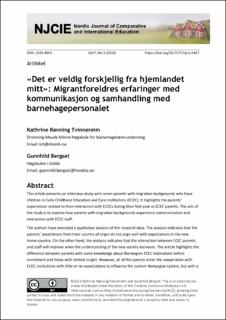"Det er veldig forskjellig fra hjemlandet mitt". Migrantforeldres erfaringer med kommunikasjon og samhandling med barnehagepersonalet
Peer reviewed, Journal article
Published version
Permanent lenke
https://hdl.handle.net/11250/3103154Utgivelsesdato
2023Metadata
Vis full innførselSamlinger
- Artikler (Articles) [173]
- Publikasjoner fra Cristin - DMMH [138]
Originalversjon
Nordic Journal of Comparative and International Education. 2023, 7 (3), 1-19. 10.7577/njcie.5457Sammendrag
This article presents an interview study with seven parents with migration backgrounds who have children in Early Childhood Education and Care institutions (ECEC). It highlights the parents’ experiences related to their interaction with ECECs during their first year as ECEC parents. The aim of the study is to explore how parents with migration backgrounds experience communication and interaction with ECEC staff. The authors have executed a qualitative analysis of the research data. The analysis indicates that the parents’ experiences from their country of origin do not align well with expectations in the new home country. On the other hand, the analysis indicates that the interaction between ECEC parents and staff will improve when the understanding of the new society increases. The article highlights the difference between parents with some knowledge about Norwegian ECEC institutions before enrollment and those with limited insight. However, all of the parents enter the cooperation with ECEC institutions with little or no expectations to influence the current Norwegian system, but with a will to adapt to it. The willingness to adapt might make the parents less likely to engage with the ECEC staff. This attitude is based upon insufficient trust in the ECEC institutions and in Norwegian society in general. The lack of trust creates worries about the consequences of not successfully adapting to the Norwegian ECEC system and more specifically about Norwegian authorities’ decisions regarding deportations and family reunifications. The article points out that support from ECEC staff and other ECEC parents might reduce this anxiety and further develop the interaction. The main conclusion of this article is that an extra effort is necessary to include parents with migration backgrounds to make sure they have enough knowledge about the Norwegian ECEC institutions to be confident about their child’s well-being and aware of their own role as an important, participating part. To ensure that this effort becomes part of the routines in ECECs this knowledge base’s implications on both the ECEC teacher education and the professional field is of importance.

